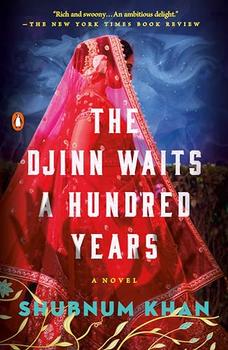Summary | Excerpt | Reading Guide | Reviews | Beyond the Book | Readalikes | Genres & Themes | Author Bio

A Novel
by Shubnum Khan
She carries it close to her chest like a secret box.
She is going Home. It is not really home, but her father says it is because he believes it. He says Home can be many places, even places you haven't been before. He says Home can also be a memory if you return to it enough. Sana wants to know exactly how many times you have to return to make a memory Home and her father says you will know when it happens.
Which isn't really an answer but she accepts it anyway.
She accepts many things about him, like the fact that he lives by a collection of axioms of his making: Home can be a memory, rivers are more reliable than roads, and the ground keeps problems in. She accepts he will never be like the fathers she reads about, strong-minded and determined, wearing suits and cracking knuckles. She accepts that without her mother he has lost some anchor and like a ship he has strayed off into uncharted waters. And so when he announces one morning that he has finally found Home, she is not surprised and simply packs up and leaves with him in their Isuzu.
Since her mother's death four years ago her father has become obsessed with coastal towns, marking cities along maps. He studies weather graphs and learns about the histories of towns along the South African coast. The west coast, he says, has many good things, like mussels and otters and small, wild roads, but it is cold and windy and there are too many white people. You can't trust a place with too many white people, he says. The east coast has warmer waters, smoother stones, and a brighter sun—and warm places help you forget the past. They help you leave behind the painful things, he adds.
When they enter the city, the salt hits the air and a streak of blue skims the horizon. They work their way toward the ocean, passing little shops, conference centers, and brick buildings, and come to a knot of streets filled with graffiti, the smells of cooking food, and blaring foreign music. As they move past Nigerian pawnshops and Somali haberdasheries, African immigrants give way to Asian ones as Pakistani chicken tikka stalls emerge between Chinese fashion outlets. Farther down, Indian immigrants adjust the signs of their small spice stores, shift uneasily away from the crowds of new foreigners, trying to make it clear they are not as fresh off the boat. They tack signs onto their storefronts that say estimated 1918 and mutter about the good old days when everything did not come from China, when customers filled their stores searching for quality cloth and spices.
The secret box in Sana's chest throbs. She is on the brink of womanhood and everything feels full and heavy with expectation; there are Discoveries That Are Waiting and Experiences to Be Had, and for a moment she allows herself the pleasure of wondering what a new life will be like.
Everything feels shivery and waiting.
"I think we're close," her father says, pointing to the small mosque with a green dome on the side of the street. He turns down a narrow road between apartment buildings that press so close together people can pass notes or pots between the windows, if they like. After a moment the tight buildings fall away and the land opens up around them.
They are driving up a hill along the ocean.
At the top they find a rusting gate, which she swings open for the Isuzu to pass. Ahead of them, in front of the driveway, stands a large house distorted by the shadows of the setting sun. Its windows seem to turn like empty eyes to watch them as they drive up.
Sana wonders if Home can be something that swallows you up.
They turn into a gravel driveway, and in the last of the light Sana sees that the entrance has the crumbling stone letters "Akbar Manzil" above it. She looks up and on the top floor she sees a figure: a girl outlined in the arched window above, watching them. Sana's breath catches and she closes her eyes quickly. She tells herself she is imagining things, that she is just tired from the journey. That nothing can follow her here. She counts to ten and opens her eyes.
Excerpted from The Djinn Waits a Hundred Years by Shubnum Khan. Copyright © 2024 by Shubnum Khan. Excerpted by permission of Viking. All rights reserved. No part of this excerpt may be reproduced or reprinted without permission in writing from the publisher.
To limit the press is to insult a nation; to prohibit reading of certain books is to declare the inhabitants to be ...
Click Here to find out who said this, as well as discovering other famous literary quotes!
Your guide toexceptional books
BookBrowse seeks out and recommends the best in contemporary fiction and nonfiction—books that not only engage and entertain but also deepen our understanding of ourselves and the world around us.